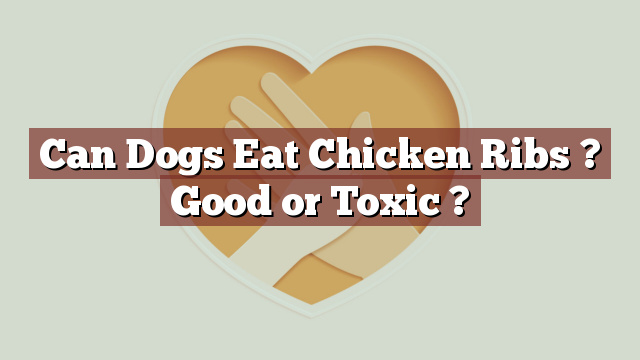Can dogs eat chicken ribs? This is a common question that many dog owners have when it comes to feeding their furry friends. It is essential to be aware of the foods that are safe and suitable for dogs, as some human foods can be harmful or even toxic to them.
Nutritional Value of Chicken Ribs: Essential nutrients for dogs’ health and well-being
Chicken ribs are a good source of protein, which is a vital nutrient for dogs. Protein helps support muscle growth and repair, as well as providing energy. Additionally, chicken ribs contain essential amino acids that contribute to a healthy coat and skin for our canine companions.
Are Chicken Ribs Safe for Dogs? Understanding the potential risks and toxicity
No, dogs should not eat chicken ribs. While chicken meat itself is generally safe for dogs, the rib bones can pose significant risks. Chicken ribs are small and can splinter easily when chewed, which can lead to choking hazards and various injuries inside the digestive tract. These splintered bones can cause blockages or tears in the throat, stomach, or intestines, potentially leading to severe complications or even surgery.
Veterinarians strongly advise against feeding dogs chicken ribs due to the potential risks associated with bone splintering. It is essential to prioritize your dog’s safety and well-being by avoiding such risky foods.
Potential Risks or Benefits of Feeding Dogs Chicken Ribs: Weighing the pros and cons
The potential benefits of feeding dogs chicken ribs, such as the protein content, are outweighed by the significant risks. Dogs can obtain their required protein from safer sources, such as lean cuts of chicken meat or specially formulated dog food.
The risks associated with chicken ribs, including bone splintering and potential injuries, far outweigh any potential benefits. It is crucial to prioritize the health and safety of our beloved pets and choose suitable alternatives for their nutritional needs.
What to Do If Your Dog Eats Chicken Ribs: Immediate actions to take for their safety
If your dog accidentally ingests chicken ribs, it is important to take immediate action. Do not induce vomiting without consulting a veterinarian, as it can worsen the situation if there are bone fragments or injuries present. Instead, observe your dog for any signs of discomfort, such as vomiting, diarrhea, or abdominal pain.
In case of any concerning symptoms, contact your veterinarian immediately. They will be able to provide appropriate guidance and may recommend an X-ray or other diagnostic tests to assess the extent of potential complications.
Conclusion: Moderation is key, consult a veterinarian for personalized advice
In conclusion, it is best to avoid feeding dogs chicken ribs due to the significant risks they pose. While chicken meat itself can be a valuable protein source for dogs, the bones can splinter and cause severe injuries. Remember that moderation is key when introducing new foods to your dog’s diet.
If you have any concerns or questions about what foods are safe for your dog, it is always best to consult with a veterinarian. They can provide personalized advice based on your dog’s specific needs and help ensure their overall health and well-being.
Thank you for investing your time in exploring [page_title] on Can-Eat.org. Our goal is to provide readers like you with thorough and reliable information about various dietary topics. Each article, including [page_title], stems from diligent research and a passion for understanding the nuances of our food choices. We believe that knowledge is a vital step towards making informed and healthy decisions. However, while "[page_title]" sheds light on its specific topic, it's crucial to remember that everyone's body reacts differently to foods and dietary changes. What might be beneficial for one person could have different effects on another. Before you consider integrating suggestions or insights from "[page_title]" into your diet, it's always wise to consult with a nutritionist or healthcare professional. Their specialized knowledge ensures that you're making choices best suited to your individual health needs. As you navigate [page_title], be mindful of potential allergies, intolerances, or unique dietary requirements you may have. No singular article can capture the vast diversity of human health, and individualized guidance is invaluable. The content provided in [page_title] serves as a general guide. It is not, by any means, a substitute for personalized medical or nutritional advice. Your health should always be the top priority, and professional guidance is the best path forward. In your journey towards a balanced and nutritious lifestyle, we hope that [page_title] serves as a helpful stepping stone. Remember, informed decisions lead to healthier outcomes. Thank you for trusting Can-Eat.org. Continue exploring, learning, and prioritizing your health. Cheers to a well-informed and healthier future!

